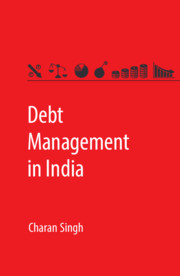Book contents
- Frontmatter
- Contents
- List of Tables and Figures
- Preface
- 1 Introduction
- 2 Public Debt in India
- 3 Ricardian Equivalence: Introduction
- 4 Ricardian Equivalence: Empirical Studies Utilising Consumption Function
- 5 Ricardian Equivalence and Consumption in India
- 6 Monetisation of Debt in India
- 7 Domestic Debt and Economic Growth in India
- 8 Separation of Debt from Monetary Management
- 9 Conclusions and Policy Implications
- Bibliography
- Index
5 - Ricardian Equivalence and Consumption in India
Published online by Cambridge University Press: 23 November 2018
- Frontmatter
- Contents
- List of Tables and Figures
- Preface
- 1 Introduction
- 2 Public Debt in India
- 3 Ricardian Equivalence: Introduction
- 4 Ricardian Equivalence: Empirical Studies Utilising Consumption Function
- 5 Ricardian Equivalence and Consumption in India
- 6 Monetisation of Debt in India
- 7 Domestic Debt and Economic Growth in India
- 8 Separation of Debt from Monetary Management
- 9 Conclusions and Policy Implications
- Bibliography
- Index
Summary
In this chapter, the empirical results of the model that has been developed in the previous chapter, incorporating the Ricardian Equivalence Hypothesis in the permanent income specification under rational expectations is presented. The model is empirically estimated and its robustness is examined in the context of India.
This chapter consists of five sections. The few empirical studies on domestic debt and consumption in India are briefly discussed in Section 5.1. In Section 5.2, the model to be estimated is briefly discussed in the context of India. This is followed by a section on data specifications and definitions used in the estimation. The empirical results are presented in Section 5.4. Finally, the conclusions follow in Section 5.5.
Review of literature of empirical studies on Ricardian equivalence and consumption in India
In India, five studies on domestic debt and consumption have been conducted. Two studies reject Ricardian equivalence, while two other yield mixed results. Ricardian equivalence is supported by only one study (Table 5.1). Amongst these, three studies (Study No. 3, 4 and 5 in the Statement) follow the models which have been developed earlier and empirically estimated for the United States. The limitations of these basic models have been critically discussed in detail in the previous chapter (Section 4.4.1). In the other two studies (Study No. 1 and 2), the equation specified and estimated appears to be ad hoc.
In all the five studies, problems of data availability, specification and estimation emerge. The most important of these is the use of the data in levels, and the definition of the income and the consumption variables. The data series on macro aggregates are generally non-stationary at levels. Hence, the use of data in levels could yield spurious results. In the case of the income variable, as discussed by Kormendi (1983), the appropriate definition would be the national income, and not private income (Study No. 1) or disposable income (Study No. 5). In the case of the consumption variable, the appropriate definition should include some component of the final consumption expenditure on durable goods. In none of these studies such a computation is attempted and either total consumption expenditure (Study No. 1 to 5) or only non-durable consumption expenditure (Study No. 5) is used in the regressions.
- Type
- Chapter
- Information
- Debt Management in India , pp. 130 - 144Publisher: Cambridge University PressPrint publication year: 2018



